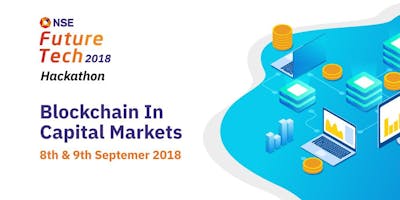FutureTech Hackathon: Blockchain in Capital Markets
The Capital Markets Working Group on Distributed Ledger Technology is proud to present in conjunction with NSE, BSE, MSEI, CDSL and NSDL the FutureTech Hackathon: Blockchain In Capital Markets Focused on Enabling Transparent & Efficient Capital Markets by leveraging Blockchain Technology.
FutureTech Blockchain In Capital Markets Hackathon is a fourth in a series of hackathons and has been attended by a total over 1,000 developers so far. This year our prize money is the biggest yet at a total of Rs 10 Lakh!
The chief guest at the Hackathon is SEBI Chairperson, Shri Ajay Tyagi. He will be accompanied by NSE CEO Mr. Vikram Limaye and others. Our panel of judges includes notable technology leaders from banks and financial markets. The participants will also receive training and assistance from several industry experts and technology experts.
Prizes
First prize: Rs 5 lakh
Second prize: Rs 3 Lakh
Third prize: Rs 1 lakh
Two special prizes: Rs 50,000 each
Schedule
Saturday, 8th September
- 11am – 11:30am : Keynote
- 11:30am - 12:30pm : Blockchain Deployment Training & Industry Experts
- 12:30pm- Onwards : Hackathon Begins
- 1pm -2pm : Lunch
- 5pm- 6pm : Snacks & Tea
- 8:30pm-9:30pm : Dinner
Sunday, 9th September
- 10am-11am : Breakfast
- 12:30pm – 2pm : Judging
- 1pm-2pm : Lunch
- 3pm-3:30pm : Finalists Compete
- 5pm : Winners Announced
Problem Statements for the Hackathon
Tokenization
Tokenization of Assets like Real Estate, Gold
Tokenization is the process of converting rights to an asset into a digital token on a blockchain. Crucial assets such as Ownership, Real Estate, Gold are difficult to verify and physically transfer. Current methods to handle these types of assets are often cumbersome to track and subdivide. Tokenization provides a useful way to solve these problems. Participants would be required to use tokenization to solve problems that would benefit Capital markets, examples of the same could be the management of collateral w.r.t trading of shares, more efficient ways of managing identity and ownership of shares. etc
Monitoring
Monitoring of User Actions like Credit, Repayment, Trades (Equity, Derivatives, etc.)
As Blockchain systems store an immutable record of all activities taking place on the chain, they can be used as a way to track user activity. Smart contracts could detect this activity and takes actions based on them. An example of the same would be that portfolio management functions using a blockchain based inventory system to manage their portfolio across multiple funds. This inventory could then be used to alert the management of compliance issues taking place due to overexposure to certain sectors. Participants would be required to build a system which can be used to monitor functions that are crucial to Capital markets.
Processing
Settlement of Business Transactions and Trades
Most settlement process in the capital markets today usually take place in the standard T+2 days, these arise due to the functional way that batching processes handle large volume. A blockchain network can be used to settle trades in a real-time manner saving time and locked up capital. Participants would be required to create a solution to improve similar such processing functions that exist in the Capital markets.
Data Sharing
Sharing of private data like credit history, identity
Coupled with tokenization blockchain networks can be used share data securely and efficiently An example of this is the RepuX platform, enterprises can sell anonymized datasets to developers who can then utilize this data to build customized applications integrating artificial intelligence and machine learning. RepuX’s blockchain-backed protocol and platform for SMEs allows various forms of corporate and user data to be monetized and exchanged between different parties. Similar systems can be used to share data such as identity, credit history etc
